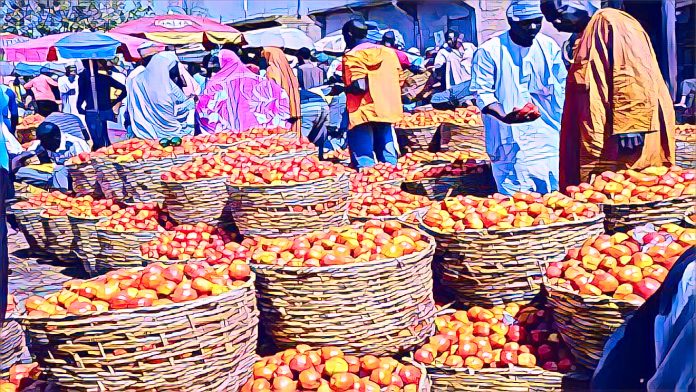As tomato prices skyrocket in Nigeria, many citizens are turning to alternative ingredients like cucumbers and cayenne pepper to fill the gap in their culinary needs. The sharp increase in tomato prices, driven by supply chain disruptions and poor harvests, has forced households to adapt their cooking habits and explore new flavors.
In markets across the country, the cost of tomatoes has surged to unprecedented levels, with prices more than doubling in some areas. This staple ingredient, essential in many Nigerian dishes, has become a luxury item for many families. The price hike is attributed to a combination of factors, including extreme weather conditions that have damaged crops, logistical challenges, and economic instability.
Lagos resident Adeola Ojo, a mother of three, described the impact of the rising prices on her family’s meals. “Tomatoes have become so expensive that we can’t afford to use them like we used to. We’ve had to get creative and use more cucumbers and cayenne pepper in our cooking,” she said. “It’s not the same, but we’re making do with what we have.”
Cucumbers, which are cheaper and more readily available, are being used as a substitute in various dishes, from salads to stews. While cucumbers don’t replicate the flavor of tomatoes, they provide a refreshing crunch and add volume to meals. Cayenne pepper, on the other hand, offers a spicy kick that can enhance the taste of many traditional Nigerian recipes.
Market vendors have noted the shift in consumer preferences. Musa Ibrahim, a vegetable seller in Abuja, said that more customers are buying cucumbers and cayenne pepper as alternatives to tomatoes. “People are looking for ways to save money, and cucumbers are much cheaper right now. Cayenne pepper is also popular because it can add flavor to food without needing a lot of other ingredients,” Ibrahim explained.
The tomato crisis has also had a ripple effect on the food industry, affecting restaurants and street food vendors. Many have had to adjust their menus and find creative ways to maintain the taste and quality of their offerings. For some, this has meant experimenting with new recipes and incorporating different ingredients.
The Nigerian government is aware of the issue and has been working on strategies to stabilize tomato prices and improve food security. Initiatives include supporting local farmers with better seeds, investing in irrigation systems, and improving storage facilities to reduce post-harvest losses. These measures are aimed at boosting tomato production and ensuring a more reliable supply chain.
Agriculture experts suggest that diversifying crops and encouraging the cultivation of alternative vegetables could also help mitigate the impact of future price shocks. Dr. Funmi Adeyemi, an agricultural economist, emphasized the importance of resilience in the face of climate change and economic challenges. “We need to support our farmers in adopting sustainable practices and exploring a variety of crops. This will not only help stabilize prices but also enhance food security in the long term,” she said.
For now, Nigerians are adapting to the tomato shortage with ingenuity and flexibility. While the high prices have disrupted traditional cooking routines, the crisis has also sparked a wave of culinary creativity, with people experimenting with new ingredients and flavors. This resilience and adaptability are key strengths of the Nigerian spirit.
In the coming months, the government’s efforts to boost tomato production will be crucial in determining whether prices can be brought under control. In the meantime, the resourcefulness shown by Nigerians in the face of this challenge offers a glimmer of hope.
Source: businessday.ng



